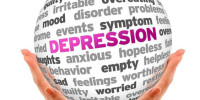

The later years of life often bring with them tremendous changes. With the freedom of retirement often comes increased isolation, which, coupled with medical problems and the loss of loved ones, finds many people entering the second half of their life with varying states of depression.
comes increased isolation, which, coupled with medical problems and the loss of loved ones, finds many people entering the second half of their life with varying states of depression.
Depression is a serious illness, one that affects 15 out of every 100 adults over the age of 65. Many who have never been depressed, may find themselves facing the onset of depression in the later part of their life due to being exposed to new stressors such as illness or hospitalization. Almost 25% of senior citizens with a chronic illness and 50% of nursing home residents are affected by depression.
It’s important to recognize that depression is not a passing mood. The sadness that comes with grief or having an off day is very different than feeling depressed. While most people who are faced with grief or sadness of some sort can usually move through regular activities with little to no problems, people who suffer from symptoms of depression are often immobilized by their symptoms. Where grief comes in waves of varying intensity, depression is a persistent, unrelenting sadness that affects all parts of a person’s life. Without treatment, depression can worsen other illnesses, lead to disability, cause premature death or result in successful suicide.
Many seniors will deny feeling sadness, but the symptoms of depression are far larger than just feeling sad. Here are some other symptoms you may experience if you are depressed:
What causes this depression?
According to Dr. Rafi Kevorkian, who specializes in Geriatric Medicine, the five D’s of depression in the elderly are:
Many seniors experience depression as a result of an illness, such as Parkinson’s or cancer. Often, in these cases, the patient will focus more on recovering from the physical ailment rather than trying to solve the mood disorder. Depression can often worsen physical symptoms, so it’s important to treat depression and the illness simultaneously, so that one does not feed into the other.
Depression is treatable. Before you decide to go the route of anti-depressants, you may want to see if any of the following steps can help.
Limit Your Alcohol Intake
Many people self-medicate with alcohol. They use it as a way to deal with loneliness or chronic pain, but alcohol itself is a depressant, and once the buzz wears off, it will only feed your depression.
Get Good Sleep
The importance of sleep cannot be stressed enough. Practice good sleeping habits. If you suffer from sleep disturbance, seek out healthy ways to fix them. Getting a good night’s sleep is vital to your mental well-being.
Talk To Someone
Whether it is a friend or a therapist, talking to someone about how you feel can help you feel 100 times better. Often people feel as though their emotional heaviness is their burden to carry, when in reality it can be shared and lifted by other people.
Spend Time With Friends and Loved Ones
Spend time with positive, caring people in your life. Loneliness can be a huge factor in causing depression. If you find yourself feeling lonely, reach out. Make new friends or connect with old ones.
Exercise
Getting your blood pumping sends happy-making endorphins to your brain, de-stresses and energizes you. It can be one of the best ways to combat depression. Just remember, the first step is always the hardest. Consult with your physician before starting any exercise program.
See A Doctor
If you’ve tried method after method, you may want to see a doctor who can prescribe you a low dose of anti-depressants. Just make sure that it doesn’t interfere with any other medications you may be on, and monitor your behavior upon taking it, reporting anything unusual to your doctor.
Author: Kimberly Recor, staff writer at Designing Brighter Tomorrows
© 2014 Designing Brighter Tomorrows, Inc.
This site is for information only, and is for your voluntary use at your own risk. See Terms of Use